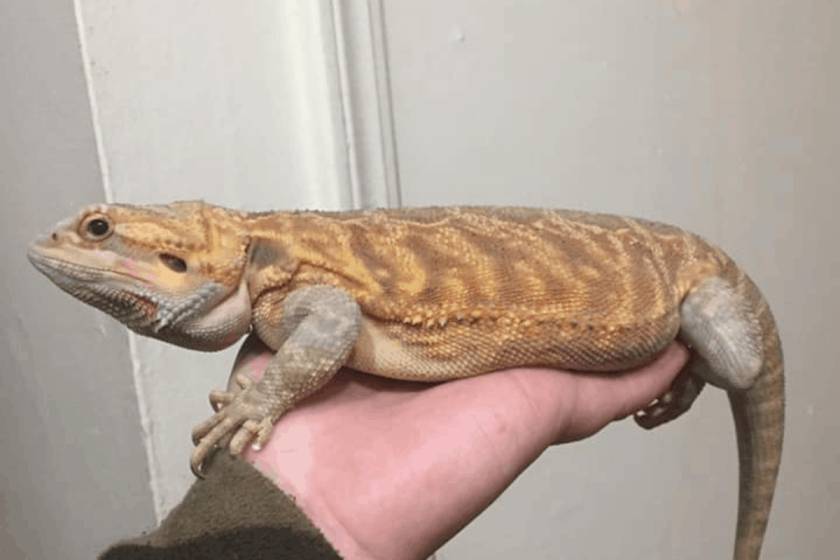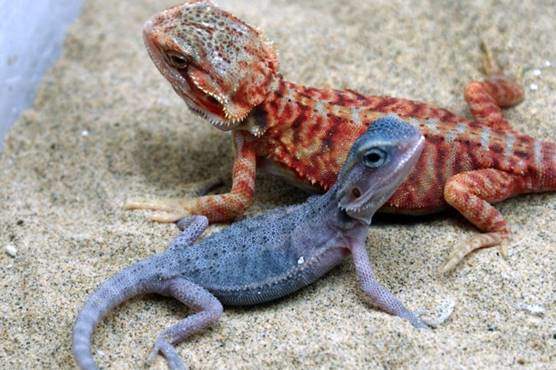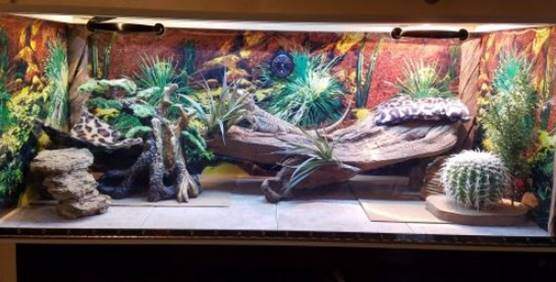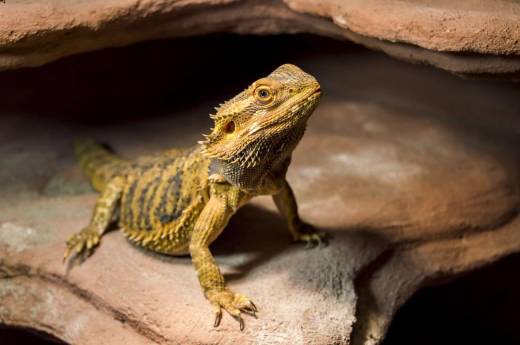Connect with a verified veterinarian in minutes. Licensed vets are available 24/7 to answer your questions. No need to worry about your furry family member.
Are you interested in becoming a pet parent of a German giant bearded dragon? Do you know much about these lovely lizards? Whether you know much about these beautiful lizards or not, we’re glad you’re here.
In this article, we’ll take a look at everything you need to know about these lizards and how to care for them. Let’s get started!
What is a German Giant Bearded Dragon?
View this post on Instagram
There are many types of bearded dragon lizards that have the ability to grow large in size. The beard is an important part of the bearded dragon, especially when it comes to their appearance. The beards are used for thermoregulation, defense, and scent.
Amphibians and reptiles are both cold-blooded, and the bearded dragon lizard (Pogona) is no exception. As they are cold-blooded, they have to maintain a certain temperature in order to survive. The bearded dragon will take in the heat from the sun during the day and then absorb the heat from the soil at night.
A German giant bearded dragon is what’s called a “morph” of a regular bearded dragon. A bearded dragon morph is a reptile specifically bred by breeders to create a specific “look” in a bearded dragon. For instance, when larger lizards are bred together, chances are their offspring will be even larger than the parents. When it comes to the German giant bearded dragon, the offspring can be as much as 50% larger than standard beardies. That’s quite a bit larger!
There are several ways to tell if you have a German giant bearded dragon or a standard version of these amazing lizards. For instance, you can tell by their size. Here’s a chart showing the differences between a German giant bearded dragon and a normal bearded dragon:
| German Giant Bearded Dragon | Normal Bearded Dragon | |
| Baby (hatchling to 6 months) | 3 to 21 inches | 3 to 14 inches |
| Adult (7 to 24 months) | 25 to 35 inches | 16 to 24 inches |
| Weight | 850 to 1000 grams | 400 to 500 grams |
When it comes to the average lifespan of German giants, they have a life expectancy anywhere between 8-12 years. However, in the wild, these lizards may live between 5-8 years. The key to their longevity in captivity is proper care and attention to their needs. With the right care, these lizards will be able to live up to 12 years.
However, with improper care, the lizard may not survive even 8 years.
View this post on Instagram
Average Bearded Dragon VS German Giant Bearded Dragon
The German giant bearded dragon is a lizard that has many different physical characteristics. The German giant bearded dragon will be bigger than a standard bearded dragon. Some may look like geckos, others may look like a smaller version of a chameleon. Some will have different colored scales, while others will have spots. Some may even have “ears” or some type of protrusions on their bodies. There are many different variations and types of German giant bearded dragons.
Bearded dragons love climbing trees in order to get out of the sun or cool down during the summer months. They also like spending time basking in the sun in order to get some extra heat. A big part of their diet is also insects, which they catch by rubbing their scales against trees and rocks. They’ll also eat grass, and they’ll eat slugs, snails, superworms ,and small lizards. In addition, they love to climb up the sides of tanks and ladders in order to get at the foods above them.
Calcium supplements are a must for bearded dragons, as they don’t get enough calcium in their diet. They will also need some additional vitamin D3 in their diet as well. It’s important to supplement your bearded dragon’s diet with the proper amount of calcium and vitamin D3, as it will ensure that your lizard stays healthy and happy.

Review symptoms, medications & behavior to keep your pets healthy with a Vet Online in just minutes.
Ask a Vet Live NowGerman Giant Bearded Dragon Food
View this post on Instagram
German giant bearded dragons need the right food in order to stay happy and healthy. It’s important to know that your beardie is an omnivore. This means he eats live food (prey, usually insects), fruits, vegetables, and even leafy greens.
When it comes to fruit, this is the smallest part of the German giant’s diet. They should only be given occasionally. The lizards obtain nutrients and water from the fruits they eat. You can safely feed these fruits to your pet lizard:
- Apples (peel first)
- Papaya
- Guavas
- Watermelon
- Red and green grapes
- Berries (strawberries, blackberries, blueberries, and cranberries)
- Plums
- Figs
- Apricots
- Seedless raisins
- Cherries (first remove the pit)
- Mandarin oranges
- Canned pineapples and prunes
- Honeydew and cantaloupe
- Peach
When it comes to veggies, your German giant bearded dragon can eat the following veggies:
- Mustard greens
- Okra
- Red & green cabbage
- Arugula
- Turnip greens
- Parsnip
- Raw kale
- Pumpkin
- Zucchini
- Leeks
- Radish
- Peeled cucumber
- Collard greens
- Squash (butternut, summer, spaghetti, and acorn)
- Green, yellow, or red bell peppers
- Basil
- Bok choy
- Dandelion greens
- Coriander
- Rocket
- Parsley
Your lizard baby will also need a source of protein. This means you’ll need to buy and/or raise insects for your German giant. They can safely eat these insects:
- Crickets
- Mealworms
- Dubia roaches
- Earthworms
- King worms
- Waxworms
- Silkworms
- Super worms
- Goliath worms
- Locusts
- Redworms
- Black soldier fly larvae
- Butterworm
- Cockroaches
While it may be tempting to try and catch wild prey for your German giant bearded dragon, it’s not a good idea. The reason is that these insects could carry parasites or even pesticides that could make your lizard very sick.
Although some of the foods on this list are harder to find, you can find them online or at your local pet store. You’ll also want to feed your bearded dragon a variety of foods so that they can get all the nutrients they need. They should eat a diet that consists of a mix of vegetables, fruits, and insects.
Pet stores and Amazon can be great places to find bearded dragon lizard food. Vitamins and minerals: It’s important to feed your bearded dragon with a healthy diet that includes vitamins and minerals. If you don’t provide your bearded dragon with a healthy diet, they can develop health problems such as scoliosis or arthritis. You can get reptile vitamins and minerals at most pet stores. The bearded dragon lizard will eat them, but they will also help to keep your bearded dragon healthy.
German Giant Bearded Dragon Habitat
View this post on Instagram
When it comes to a place to live, your German giant will need a specialized habitat. He requires the proper environment to keep him healthy.
The terrarium you choose should be large enough to allow your German giant bearded dragon to have enough room to stretch out and move around.
The cage should be a large enough size for your bearded dragon to stand up, turn around, and climb around. If you choose to use a smaller cage, it will not provide enough room for your bearded dragon. In addition, the smaller cage is not as safe as the larger one since the lizards can’t easily hide from it if they feel threatened. The cages should be filled with clean soil that is free of sharp objects such as rocks or glass.
A water bowl will also be needed in order for your German giant bearded dragon to drink and keep his tank clean. It’s best if you use a bowl that is made of ceramic so that it doesn’t break easily when placed on the ground or floor of the cage.
You’ll need a tank that’s at least 50 gallons to start out, depending on the size of your lizard. Next, the tank will need a screen to keep your lizard from climbing out of his home. You’ll also need a heat lamp to keep the lizard warm and comfortable. To check on the temperature inside the habitat, it’s also important to buy a thermometer.
Next, it will be necessary to buy a hygrometer to measure the humidity level inside your German giant’s habitat. The habitat will also require a substrate. Be sure to choose one that maintains moisture. You can also add plants, branches, and more to your German Giant’s habitat.
Your lizard’s habitat will need to be cleaned on a regular basis. Before cleaning the tank, be sure to move your German giant to a safe place. Then wipe down the habitat with warm, soapy water, and rinse thoroughly.
Common Health Problems in German Giant Bearded Dragons
View this post on Instagram
Just like other pets, German giants can suffer from certain health issues, including:
- Kidney disease
- Parasites
- Nutritional disorders
- Respiratory infections
- Stress & anxiety
- Shedding problems
If your German giant is showing any symptoms of being ill, then it’s necessary to take him to the vet. The vet can check to see if there are any underlying health issues that could be causing the symptoms.
Do German Giant Bearded Dragons Bite?
This is a common question, and we have to say yes. They can definitely bite! And because these are large lizards, they do have stronger jaws. So, their bites can be painful. Also, keep in mind these lizards do have small, sharp teeth. It is possible the lizard could draw blood.
The lizards may bite out of fear or if they’ve been caught by surprise. They may also bite due to being handled too roughly, restricting their movement, if they’re hungry and more. In other words, they only bite for a reason.
There are some things you can do to stop your German giant from biting. Try to go slowly when moving around your German giant. Remember to handle the lizard gently and do not cause it to be afraid. One more tip—always pick up your German giant from the side and do so slowly. This is because predators swoop down from above to pick up the lizard. So, pick your lizard up slowly and from the side. This may help him not to feel like he’s under attack.
There you have it! We hope this guide has given you the basics on how to care for your German Giant Bearded Dragon. With proper care, your German giant can live a long time, bringing you both much happiness through the years!
Connect with a verified veterinarian in minutes. Licensed vets are available 24/7 to answer your questions. No need to worry about your furry family member.

Kyoko
Kyoko is from a family of 3 and moved to New York with her parents and siblings when she was 13. Kyoko is fond of spending a great amount of time with pets, specifically her beagle Luna and cat Missy. Her boyfriend often complains that she spends too much time giving attention to their animals. Kyoko has written dozens of articles concerning pets and is aiming at owning a pet shop one day!
Review symptoms, medications & behavior to keep your pets healthy with a Vet Online in just minutes.
Ask a Vet Live Now




